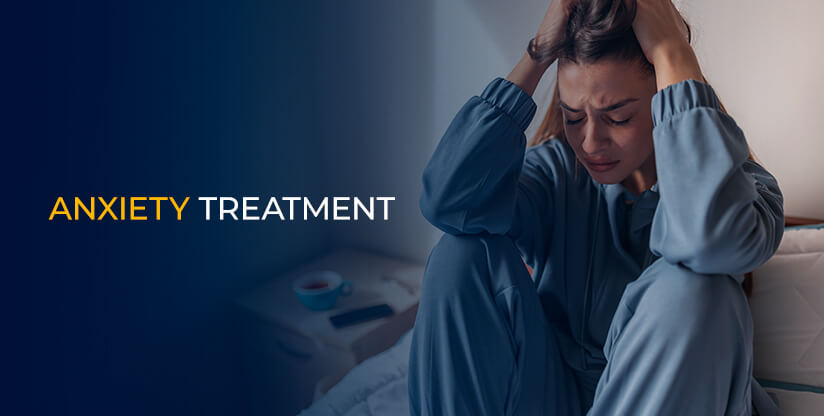

Anxiety is one of the most common mental health conditions in the U.S., impacting approximately 19% of adults. Clinical anxiety is different from the typical reaction people might experience from dangerous or stressful situations. It’s characterized by unfounded fears that impact everyday activities at work and home. These fears can prevent people with anxiety from participating in social activities and lead to academic and career issues.
Studies find that people with anxiety have a higher chance of struggling with substance use disorder than the rest of the population. Over time, self-medication can lead to drug or alcohol cravings — and often, increased substance use to maintain the level of desired feelings.
Anxiety is characterized by excessive worry, fear, and apprehension. The symptoms can vary from person to person and the exact form of anxiety, but generally include:
It’s crucial to note that anxiety symptoms can range from mild to severe and significantly impact a person’s daily life. If you or someone you know is experiencing these symptoms, a professional can accurately diagnose an anxiety condition and determine the appropriate treatment plan.
Invasive and overwhelming feelings of worry and fear characterize a few anxiety disorders. Each disorder can have symptoms that vary in severity and perplexity. The following are the most common types of anxiety disorders:
Someone with a generalized anxiety disorder may be plagued with chronic and excessive worry about various aspects of their life. They usually have a general sense of foreboding that something will go wrong in their professional or personal life or health. GAD also often triggers physical symptoms, such as:
Panic disorder involves periodic and unforeseen panic attacks, which are intense episodes of fear or distress. Panic attacks can cause symptoms like rapid heartbeat, shortness of breath, dizziness, chest pain, and feelings of dread. These attacks can come on suddenly without warning. People with panic disorder often develop a fear of having future panic attacks, leading to avoidance behaviors.
Specific phobias are intense and irrational fears of specific objects, situations, or activities. Common phobias include a fear of spiders, heights, flying, and enclosed spaces. Individuals with phobias often go to great lengths to avoid the feared stimuli. Agoraphobia is a common phobia that involves a fear of leaving environments one perceives as safe. Individuals struggling with agoraphobia may avoid leaving their homes for days, months, or years.
Social anxiety disorder, also known as social phobia, involves an intense fear of social situations and being negatively judged or embarrassed by others. People with mild social anxiety might experience extreme self-consciousness or difficulty speaking in front of others, while those with severe social anxiety might avoid social gatherings altogether. They may worry about rejection or offending others and have trouble maintaining relationships. Physical symptoms like trembling, blushing, and sweating might occur in social situations.
OCD involves the presence of obsessions and compulsions. Obsessions are intrusive and unwanted thoughts, images, or urges that cause distress, while compulsions are repetitive behaviors or mental acts performed to alleviate anxiety. Common obsessions might include maintaining a specific level of cleanliness or symmetry, while common compulsions include excessive handwashing, checking, and counting.
PTSD often develops after experiencing or witnessing a traumatic event. Symptoms can include intrusive memories, nightmares, flashbacks, emotional numbness, hypervigilance, or the constant need to assess potential threats nearby. Common examples of trauma that can lead to PTSD include natural disasters, abuse, serious accidents, or crime. Individuals might experience flashbacks of the trauma that interfere with their ability to maintain an everyday routine for months or years after the traumatic experience.
Anxiety and addiction often go hand in hand, with each condition influencing and exacerbating the other. The relationship between the two is complex and multifaceted — understanding the connection better can help you get effective treatment. Here’s how anxiety and addiction are linked:
Effective treatment requires an integrated approach because of the complex relationship between anxiety and addiction. A multidisciplinary team must address both conditions with therapies that target the underlying anxiety and addictive behaviors. This might involve medication management, cognitive-behavioral therapy, support groups, and stress management techniques.
At Gateway Foundation, our multidisciplinary team provides anxiety treatment in Chicago, Illinois, that includes several evidence-based and holistic therapies. These therapies can help you overcome addiction while teaching you how to cope with mental health conditions like anxiety and depression. These treatment options can also help you improve your overall health and wellness, promoting a lasting recovery.
Treatments offered in our anxiety treatment center include:
Medication-assisted treatment is an approach that combines medicine with therapies for a more comprehensive approach. Professionals might prescribe medications like selective serotonin reuptake inhibitors (SSRIs) to manage anxiety symptoms. At the same time, professional detox and medicines like bupropion can alleviate uncomfortable withdrawal symptoms to help you focus on your overall recovery.
DBT is a form of behavioral therapy that focuses on developing skills to manage intense emotions, enhance mindfulness and improve interpersonal relationships. It involves individual therapy, group skills training, and coaching for skill application in real-life situations. In DBT sessions, you can gain practical strategies for coping with anxiety and other emotional issues that might have contributed to your addiction.
Mindfulness-based sobriety combines mindfulness practices with sobriety principles to address anxiety and addiction simultaneously. It incorporates mindfulness meditation, cognitive-behavioral skills training, and relapse prevention strategies to ensure a more effective recovery. Mindfulness-based sobriety can help individuals develop more awareness of their thoughts and emotions without judging them or allowing them to control their life. The treatment method can also help people build resilience and cultivate healthier coping mechanisms.
Motivational interviewing is a collaborative, goal-oriented approach that helps individuals explore and resolve ambivalence about change. While often used to help people with addiction, it can also benefit anyone with anxiety who might have mixed feelings about seeking treatment. Motivational interviewing aims to enhance motivation for change and help individuals overcome barriers to treatment engagement.
In addition to the above therapies, support groups, and 12-step facilitation programs, like Alcoholics Anonymous (AA) or Narcotics Anonymous (NA), can help people with anxiety and co-occurring substance use disorders. These programs offer a supportive community, peer mentorship, and structural steps toward recovery.
Anxiety treatment can help you learn more about yourself, establish healthier coping mechanisms, and build resilience to help you in all aspects of your life. It’s crucial to seek professional treatment centers that tailor your program to your needs and circumstances.
Here’s how Gateway’s anxiety treatment program can help you with anxiety.
Ultimately, anxiety treatment can help you regain control over your anxiety while improving your quality of life. Professional treatment centers offer a safe, supportive space to explore and address underlying causes of anxiety, while therapists can help you establish healthy coping skills and make positive lifestyle changes.
Below are a few questions people often have about Gateway’s anxiety treatment:
You might benefit from anxiety treatment if you struggle with persistent worry, panic, or fear that interferes with your personal and professional life. Additionally, if you self-medicate with substances or alcohol, it might be time to seek professional help. Mental health professionals can assess your symptoms and develop an appropriate treatment plan.
Anxiety treatment can be highly effective in reducing your symptoms and helping you achieve a healthier life. While it might not eliminate anxiety, treatment can reduce anxiety’s impact on your personal and professional goals and everyday routine. Treatment aims to help you lead a fulfilling life despite anxiety. With the right approach, you can gain healthy coping skills contributing to better resilience and long-term wellness.
How long anxiety treatment lasts depends on your unique needs, including the severity of your symptoms and whether you have co-occurring conditions. Some people can benefit from short-term therapy that might last a few weeks or months, while others require long-term treatment plans. Professionals can assess your needs, progress and determine the right length of treatment you’ll need.
Yes, medication management can be used in anxiety treatment plans. At Gateway, our multidisciplinary team can prescribe antidepressants and anti-anxiety medications to help manage your symptoms. If you are struggling with addiction and require detox, we provide certain medicines that can reduce withdrawal symptoms and keep you safe and comfortable throughout your recovery journey.

Our anxiety treatment program provides a full range of therapies that form the basis for our holistic treatment of your condition. These therapies have been proven to help our patients overcome addiction and to learn to cope with any mental health conditions such as anxiety so that they can begin and continue on their recovery journey. Our therapies can help you grow strong and healthy while learning the skills that will facilitate success after treatment.
The services offered in our anxiety treatment center include:

If you or your loved one needs treatment for anxiety disorder and drug use, please call our anxiety and OCD treatment center today at 877-505-4673. You can also send us an instant message through our contact page.
We’ve been offering effective treatment for substance misuse, anxiety disorders and other mental health issues for over 50 years in the Illinois area. Come over to Gateway to receive high-quality, compassionate, caring, friendly, non-judgmental and life-saving anxiety treatment in Chicago, IL, that works.


We use cookies to give you the best experience on our website. If you continue without changing your cookie settings, we assume that you consent to our use of cookies on this device. You can change your cookie settings at any time but if you do, you may lose some functionality on our website. More information can be found in our Privacy Policy.
